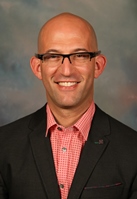
Phillip Levy, M.D., M.P.H., professor of Emergency Medicine for the Wayne State University School of Medicine, has been appointed to serve as a member of the National Institutes of Health's Cancer, Heart and Sleep Epidemiology Study Section.
Dr. Levy, who also serves as associate chair of Research for the Department of Emergency Medicine, will serve a four-year term that ends June 30, 2020.
Study sections review NIH grant applications, make recommendations to the appropriate national advisory councils and survey the status of research in their respective fields. Members are selected on the basis of their demonstrated competence and achievement in their scientific discipline as evidenced by the quality of research accomplishments, scientific publications and other achievements and honors.
The Cancer, Heart and Sleep Epidemiology Study Section reviews applications for grants related to epidemiologic research in the areas of cancer, cardiovascular disease and sleep conditions in human populations. Cardiovascular disorders considered include myocardial ischemia and infarction, cardiac hypertrophy and failure, cardiovascular arrhythmia, blood pressure and hypertension, atherosclerosis, heart rate, atrial fibrillation, cardiac arrhythmias, coronary heart disease, dyslipidemia and peripheral arterial disease. Sleep conditions considered include sleep apnea, sleep disordered breathing, sleep disturbances, fatigue and insomnia. Areas related to cancer include cancer of the breast, prostate, digestive system, reproductive system, head and neck, skin, bone and lung, and hematologic and childhood cancers.
"Being entrusted to evaluate the scientific merit of grant proposals put forth by the top minds in medicine is an honor and a privilege," said Dr. Levy, who also directs the WSU Clinical Research Service Center. "I am extremely proud of my appointment to the CHSA study section and look forward to my next four years of service."
Dr. Levy is leading a number of studies related to high blood pressure and cardiovascular disease, including research to determine how vitamin D affects cardiac structure and function, and vascular function in African-Americans with hypertension. That study, funded by an NIH R01 grant, could identify vitamin D as a safe, effective and inexpensive therapy to stop, and even reverse, cardiac ravages caused by high blood pressure.